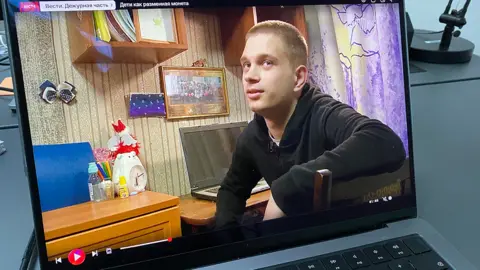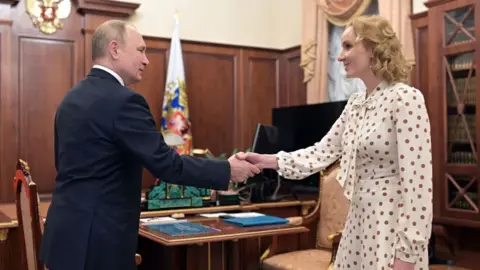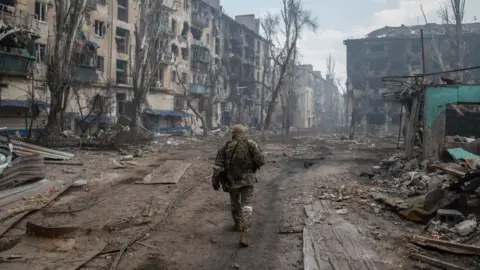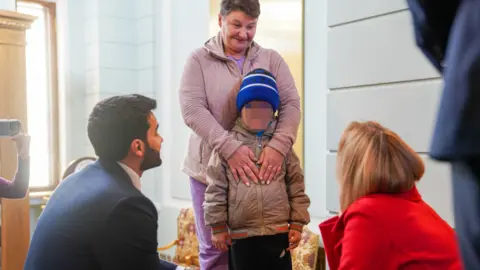Ukrainian teen who received call-up to Russian army
 VESTI.RU/BBC
VESTI.RU/BBCA 17-year-old Ukrainian who was moved from Ukraine to Russia found out recently he was facing the prospect of being conscripted into the army fighting against the country of his birth.
Bogdan Yermokhin, originally from the Ukrainian city of Mariupol, tried to return to Ukraine in March but was stopped by Russian border guards.
He is soon due to turn 18 and was ordered to report to a Moscow region draft centre next month.
But then his plight became public knowledge and after his lawyer appealed to President Volodymyr Zelensky for help, Russia appears to have had a change of heart.
Russian's children's commissioner Maria Lvova-Belova announced on Friday that he would soon be taken abroad to meet his cousin, and Ukraine confirmed the plan.
Bogdan Yermokhin was orphaned in 2014 and before Russia's invasion of Ukraine he lived with a foster family in the port city of Mariupol. The director of a technical college where he was studying became his legal guardian in 2021.
In 2022, Mariupol was seized by Russian forces after one of the bloodiest battles of the war, and Bogdan ended up in Russia. It remains unclear how or why he was moved.
Russia's children's rights commissioner said he was among Ukrainian children "found in cellars" by Russian soldiers, during their brutal siege on the city.
Ukraine has produced a list of nearly 20,000 Ukrainian children it says were forcibly deported to Russia, a potential war crime. Ukraine believes the true number could be far higher.
Moscow rejects the accusations and says the children were taken into Russian territory for their own safety.
But in March 2023, the International Criminal Court issued arrest warrants for Ms Lvova-Belova and President Vladimir Putin. The ICC said Russia's aim was "permanently removing these children from their own country."
Bogdan Yermokhin was transferred first to the city of Donetsk in Russian-occupied Ukraine and later to a youth summer camp in the Moscow region with a group of 30 Ukrainian children, including one boy fostered by the children's rights commissioner herself.
 MIKHAIL KLIMENTYEV/SPUTNIK/AFP
MIKHAIL KLIMENTYEV/SPUTNIK/AFPThe teenager was eventually put in the care of a local foster family and given Russian documents. He entered a college in Russia to continue his studies and Ms Lvova-Belova also claimed that he worked in summer camp aiming to "integrate" teenagers from Russian-occupied Ukraine.
In addition to his Russian documents, Bogdan Yermokhin received Russian call-up papers.
This was confirmed to the BBC by Irina Rudnitskaya, who became his legal guardian in Russia in 2022.
Ms Rudnitskaya argued that he was not at risk of being sent to fight in Ukraine. "He is a student," she said, adding that "new recruits do not take part in the Special Military Operation" - using Russia's official term for its full-scale war.
Maria Lvova-Belova agreed, accusing the media of "hype".
Russian authorities have frequently insisted that new recruits are not sent to the front line, but the BBC has established on multiple occasions that this has in fact happened.
 SOPA Images
SOPA ImagesIn April 2023, Maria Lvova-Belova announced at a news conference that Bogdan Yermokhin had tried to return to Ukraine on his own.
She said that Russian border guards had managed to stop him.
"We caught him on the border with Belarus," she announced. "We managed to stop him at the last minute."
Both the Russian children's commissioner and journalists from Russian state TV were adamant the teenager had been "deceived by manipulation and threats" and they accused Ukrainian authorities of trying to lure him back to Ukraine.
"A very positive boy, he had helped our military, he was so pro-Russian," Ms Lvova-Belova declared.
In her latest remarks on social media on Friday, the children's commissioner was adamant that up until October he had wanted to stay in Russia, and that Russian authorities had done nothing against his will.
"Now Bogdan's opinion on where he would like to live has changed and he plans to return to Ukraine."
Before his earlier failed attempt to leave Russia in March, at least one other Ukrainian teenager from Mariupol placed in a Russian foster family succeeded in returning to Ukraine.
Ukraine's human rights ombudsman, Dmitry Lubinets, said the boy, who he named Serhiy, had sought help online from Ukrainian chat bots in December 2022.
Bogdan Yermokhin was also active on social media, but he stopped posting under his name in March, at around the time of his attempt to leave Russia.
The woman who fostered him, Irina Rudnitskaya, is a foster care activist in the Moscow region and local media say she has raised at least 12 children and received medals for her work.
Russian authorities, at least at the beginning, preferred to place Ukrainian children in foster families with some experience, the BBC understands.
 Reuters
ReutersBoth Bogdan's Russian foster family and his former Ukrainian guardians have confirmed to the BBC that Russian authorities now consider him a Russian citizen, so he would have been obliged to serve in the army under Russian law.
But under international law issuing documents in occupied territories is illegal and Ukraine condemns the practice. This became one of the grounds for the ICC's arrest warrant for Maria Lvova-Belova.
As far as Ukraine and the rest of the international community is concerned, Bogdan Yermokhin remains a Ukrainian citizen, and the Russian military summons is illegal.
The Russian children's commissioner denies authorities have engaged in any illegal activity and Moscow rejected claims it impedes the return of minors to Ukraine.
However, its authorities insist only mothers or other close relatives can make their way to Russia in person to take their children back to Ukraine.
In many cases this is impossible, particularly when a child is orphaned or if relatives are not in a position to travel.
As for Bogdan Yermokhin, Ukraine's ombudsman has confirmed an agreement has been reached on his return to Ukraine, to be reunited with his relatives.
